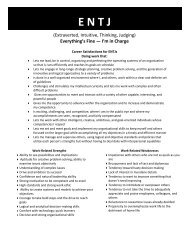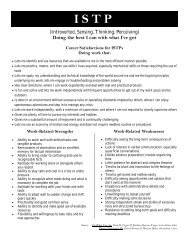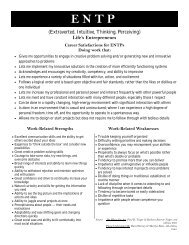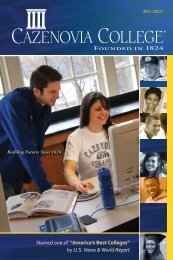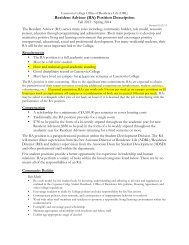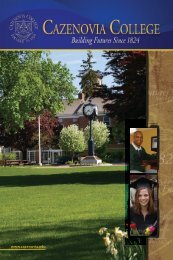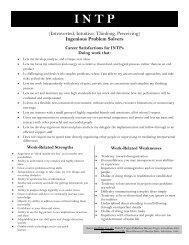of
2013-14 Academic Catalog - Cazenovia College
2013-14 Academic Catalog - Cazenovia College
- No tags were found...
Create successful ePaper yourself
Turn your PDF publications into a flip-book with our unique Google optimized e-Paper software.
SM 250/350 Service Learning/Laboratory Experience<br />
1 credit (AS)<br />
An added component to course <strong>of</strong>ferings in any semester, this<br />
course provides students with public outreach experience or<br />
an additional field/laboratory experience while reinforcing<br />
concepts learned in coursework. A contractual agreement<br />
between the instructor and student(s) will outline the<br />
objectives <strong>of</strong> the project and the credit level to be received at<br />
the completion <strong>of</strong> the project. May be repeated for credit if<br />
associated with a different topic. Prerequisite: Permission <strong>of</strong> the<br />
instructor.<br />
SM 261 Statistics<br />
3 credits (AS)<br />
Statistics is designed for students interested in social,<br />
behavioral and natural sciences, business, and economics.<br />
Topics include descriptive statistics; counting methods;<br />
probability and probability distributions including binomial,<br />
normal, Poisson, and t-distributions; estimation; hypothesis<br />
testing; chi-square applications; linear regression and<br />
correlation. Technology will include the use <strong>of</strong> statistical<br />
s<strong>of</strong>tware and will be introduced through workshops.<br />
Prerequisite: SM 161 College Algebra or SM 165 Pre-Calculus ("C"<br />
grade or better strongly recommended) or permission <strong>of</strong> the instructor<br />
SM 265 Calculus I<br />
3 credits (AS)<br />
This course is an introduction to calculus with an exploration<br />
<strong>of</strong> the properties <strong>of</strong> relations and functions, limits and<br />
continuity, derivatives, related rates and other applications <strong>of</strong><br />
the derivative. Students will also be introduced to Integral<br />
calculus. Prerequisite: SM 165 Pre-Calculus or equivalent, or<br />
permission <strong>of</strong> the instructor.<br />
SM 266 Calculus II<br />
3 credits (AS)<br />
This course is a continuation <strong>of</strong> SM 265 Calculus I. Students<br />
will explore the indefinite and definite integral techniques <strong>of</strong><br />
integration, applications <strong>of</strong> the integral, infinite sequences and<br />
series, power series and Taylor and Maclaurin series. (Offered<br />
annually) Prerequisite: SM 265 Calculus I<br />
SM 302 Wetlands Ecology<br />
4 credits (AS)<br />
A coordinated lecture/laboratory approach that will<br />
emphasize wetlands within the continental United States. The<br />
course will provide a background in both historical and<br />
modern wetland issues; characteristics <strong>of</strong> freshwater,<br />
estuarine, and marine wetland types, including important<br />
plants and animals <strong>of</strong> each; processes <strong>of</strong> wetland<br />
determination and delineation; regulatory framework <strong>of</strong><br />
wetlands protection; and procedures involved in wetland<br />
restoration and conservation. Students will also gain<br />
experience in wetlands research. (Offered fall term alternate<br />
years) Pre-requisite: SM 140 or SM 117 or equivalents, or permission<br />
<strong>of</strong> the instructor.<br />
SM 306 Field Natural History<br />
4 credits (AS)<br />
Field Natural History is the study <strong>of</strong> organisms in their<br />
natural environments. In this class, students will explore the<br />
fields, forests and waterways <strong>of</strong> Central New York through<br />
lectures, readings, discussions and laboratories. The student<br />
will develop identification and observation skills as well as<br />
experience in using digital video equipment and the computer<br />
programs associated with this technology. There are three<br />
lectures and a lab every week. Fulfills the lab science<br />
requirement. (Offered alternate years) Pre-requisite: SM 117 and<br />
SM 118 or equivalents<br />
SM 307 Animal Behavior<br />
3 credits (AS)<br />
This course surveys the basic principles <strong>of</strong> animal behavior.<br />
We examine the proximate and ultimate causes <strong>of</strong> behavior,<br />
including the role that ecology, culture, evolution, and<br />
genetics play in behavior. Our focus will be both on the<br />
behaviors themselves and how we, as scientists or critical<br />
thinkers, can determine the causes for any particular behavior.<br />
Does not fulfill the lab science requirement. (Offered spring<br />
term alternate years) Pre-requisite: SM 117 and SM 118 or<br />
equivalents, or permission <strong>of</strong> instructor.<br />
SM 311 Global Environmental Issues and Perspectives<br />
3 credits (AS)<br />
Environmental problems <strong>of</strong>ten transcend countries’<br />
boundaries. A global perspective towards pressing<br />
environmental issues such as resource and energy depletion,<br />
sustainability, global warming, and pollution is examined. By<br />
using case studies and readings, students will explore how<br />
governments and international NGO’s (Non Governmental<br />
Organizations) attempt to address and resolve these<br />
problems. (Offered on a rotating basis)<br />
SM 314 Field Botany<br />
4 credits (AS)<br />
This course focuses on field recognition <strong>of</strong> individual plants<br />
and on the ecological structure <strong>of</strong> botanical communities <strong>of</strong><br />
Central New York. Emphasis is on identification and ecology<br />
<strong>of</strong> the plants, herbarium preservation as a means <strong>of</strong><br />
maintaining a record <strong>of</strong> local flora. There are three lectures<br />
and a lab each week. Fulfills the lab science requirement.<br />
(Offered alternate years) Prerequisite: any introductory biology<br />
course.<br />
SM 315 Genetics<br />
4 credits (AS)<br />
This course is an introduction to classical genetics, modern<br />
developments and evolutionary trends in genetics. We will<br />
consider major contemporary problems <strong>of</strong> importance related<br />
to genetics, such as genetic engineering, forensic genetics, and<br />
medical genetics. The laboratory is integrated with classroom<br />
topics and incorporates DNA techniques, simulations,<br />
recitation/discussions and experiments. There are three<br />
lectures and a lab every week. Fulfills the lab science<br />
Academic Catalog | Cazenovia College | www.cazenovia.edu 177




